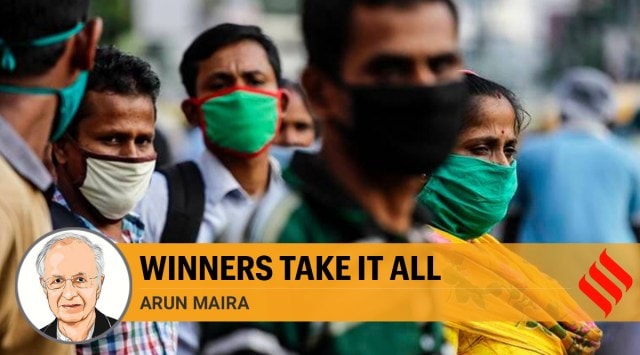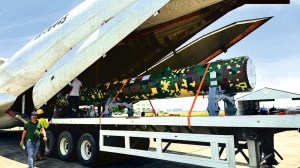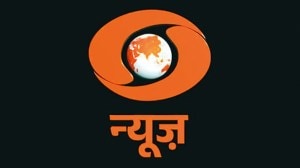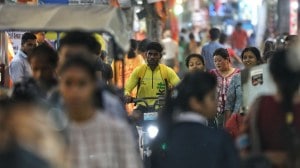- India
- International
Post-Covid world must find ways to reduce distorting power of global capital
The way the rules of the economy and trade are made must change to create a more just and resilient world. Voices of the poorest people and their associations must be heard more loudly than the opinions of the rich and their lobbies.
 Commuters wearing face masks as a precautionary measure against the coronavirus wait for a bus in Kolkata(AP Photo/Bikas Das)
Commuters wearing face masks as a precautionary measure against the coronavirus wait for a bus in Kolkata(AP Photo/Bikas Das)Debates about free trade pit those who advocate the value of economic growth against those who advocate values of justice. Many who support openness in trade also say that the present rules of the game are not just. They are concerned about how the rules of the game are framed.
The Economist (October 5) says, “Investor-state dispute-settlement (ISDS) clauses of international trade and investment agreements give foreign investors the right to resort to a secretive tribunal of well-remunerated corporate lawyers to seek compensation when they are in disagreement with a host government. They threaten governments who want to pass laws that seem self-evidently in their country’s and even the world’s interests”. Nearly 150 members of the European and national parliaments have signed a letter saying the ISDS threatens the climate ambitions of EU countries. The ISDS has been used more than 1,000 times so far, and seven of 10 of the biggest compensation awards received by investors since 2012 have been to fossil-fuel companies.
The interests of remote financial investors are considered superior, in global trade rules, to the rights of local people represented by their own democratically elected governments. TRIPS (the Agreement on Trade-Related Aspects of International Property Rights) is another egregious example. Lobbies of multinational pharma companies want to protect their investors with intellectual monopolies under TRIPS, denying affordable medicines to the world’s poorer people.
Investors are gaining more power over the rights of people within India, too. The Environmental Impact Assessment (EIA) notification 2020 mooted by the government intends to make it easier for investors to take over lands for projects by debilitating the assessment process which requires that communities be heard. The new labour codes passed by Parliament to simplify regulations have also weakened the rights of workers to be represented by unions.
The world wasn’t healthy before COVID-19 struck. Climate change isn’t being arrested. Some world leaders even deny that businesses have contributed to it. At the same time, a majority of workers around the world have precarious incomes without firm employment. New business models are throwing more workers into short-term contractual arrangements to make it easier for investors to do business. People and the planet are suffering, while profits increase. Vulgar inequalities between those who earn incomes from their financial investments, and those who have to labour to earn, have been made stark by COVID-19. Meanwhile, countries compete on the World Bank’s Ease of Doing Business rankings (presently under a cloud) to make themselves more attractive to global investors.

An era is passing. Fifty years ago, Milton Friedman wrote in the New York Times that the business of business must be only to make profits because that is how business serves society. Ronald Reagan, inspired by Friedman and the Chicago school of economics, declared in his inaugural address, 40 years ago, that government is not the solution, it is the problem. After COVID-19, everyone, including businesses, is asking governments to do more to pull the economy out of the crisis.
Never waste a crisis, some say. Therefore, free-market economists and business lobbies are now urging the Indian government to use its parliamentary majority to initiate reforms in labour, environment and agriculture laws. They want markets to work more efficiently; and they want India to be more attractive for investors.
In good markets, the terms of trade must be fair to both suppliers and buyers. In India, terms of trade have been stacked against small farmers to keep prices low for consumers; against small enterprises in financial markets, and also when they supply to large buyers in global supply chains. The terms of trade are unfair for all workers (including those self-employed) who are on the supply side of labour markets vis-à-vis those who pay them. Small people do not have clout in any market. Those with more money set the terms of trade.
“Put your money where your mouth is”, is a common expression wherever money talks. Economist Albert Hirschman saw the contradiction between institutions of capitalism and democracy building up 50 years ago. He pointed out, in his book Exit, Voice, and Loyalty (1970), that Milton Friedman had expressed his difficulty in accepting the notion that people should desire to express their views to make them prevail. Friedman described this as a resort to “cumbrous political channels”. He would much rather they resort to “efficient market mechanisms” and use their money rather than their mouths to make their opinions known.
But what if people have little money, or no money? How can they influence reforms to make them just for poor people and less harmful for the environment? Their wealth is in their numbers, not in bank accounts. Therefore, workers, tiny enterprises, consumers and citizens must be encouraged to form stronger associations — not prevented from forming them for making life easier for investors.
The global governance crisis is a conflict between the governance principles of capitalism and democracy. Capitalism runs on the principle of property rights: Those who own more must have a greater say in the governance of the enterprise. One dollar gives one vote; a million dollars gives a million. Democracy, on the other hand, runs on the principle of human rights. Every human being, whether she owns a billion dollars, or none, has an equal vote. Money is speaking too much in fixing the rules of the game: It influences elections; it controls the media; it powers lobbies for reforms at international and national levels.
The way the rules of the economy and trade are made must change to create a more just and resilient world. Voices of the poorest people and their associations must be heard more loudly than the opinions of the rich and their lobbies.
This article first appeared in the print edition on October 28, 2020 under the title “Winners take it all”. Maira is author of The Learning Factory: How the Leaders of Tata Became Nation Builders
EXPRESS OPINION
More Explained
Apr 20: Latest News
- 01
- 02
- 03
- 04
- 05









































